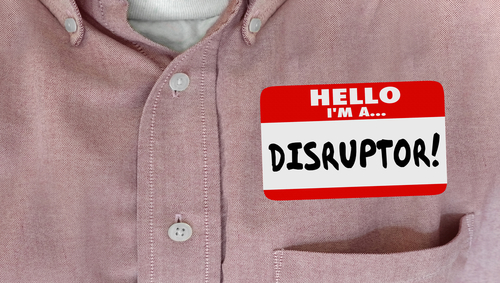
The term “disruption” has become so overused that a certain amount of eye rolling quickly ensues on just hearing it. It is a word that is thrown around a lot in the business and start-up space with many companies latching on to a buzzword and claiming all sorts of disruption. But what exactly is disruptive technology and when is it, if it is ever, appropriate to call yourself a disrupter?
“Disruptive innovation” has a very specific definition that originated with Harvard Business School Prof. Clayton Christensen. According to Christensen, a disruptive technology or “disruptive innovation” is a new emerging technology that unexpectedly displaces an established one.
However, regardless of its definition, the word is now frequently used incorrectly and truly disruptive business models are few and far between. Even Harvard Business Review agrees it’s being overused. “If a start-up launches a better product, at a higher margin, to an incumbent’s best customers — that’s not disruption. That’s just … innovation,” says Maxwell Wessel.
A characteristic of disruptive technologies is that they focus on convenience, flexibility and simplicity for the consumer. With disruptive technology the traditional way of doing business becomes nearly obsolete. Tangible examples include on-demand television completely changing traditional television viewing habits, PC’s replacing typewriters, broadband and wireless networks, MP3 and Napster versus the music industry, etc.
Looking at the hotel industry, Airbnb might be considered a disruptor. “Airbnb has turned the hospitality industry on its head, capitalizing on the rise of the sharing economy and mobile technology to provide unorthodox options for anybody seeking a roof over their head and a comfortable bed.” But will AirBNB actually displace traditional hotels? Not yet, but it may be too early to tell.
So are mobile PMS, self check-in and out, and keyless entry candidates to be considered disruptors? Like airport check-in, there is a chance that traditional processes may, in fact, be displaced. The seeds of these paradigm shifts are quietly being sown and are creating a “new normal” for both guests and hoteliers alike.
At StayNTouch, we are amused by other companies that rush in to claim the “disruptor” badge. Our feeling is that the real focus should be on whether new technologies can help hotels respond to changing guest expectations. For example, our technology doesn’t displace core business processes like rate management. However, our technology does act as a catalyst for hotels. It resolves underlying social and business needs that have been waiting to come to the surface but had no vehicle for doing so.
Specifically, personalized guest experiences have been a very trending concept in hotels for the past 5 years. Existing business processes and technologies really can’t adjust to make that promise a reality. When a company like StayNTouch comes along, it lights a fuse. Suddenly hotels can leapfrog competition because they can now deliver a new, relevant guest experience. Does that count as a disruption? To us, it doesn’t really matter – change is coming one way, or the other.
By Karen O’Neill, StayNTouch






